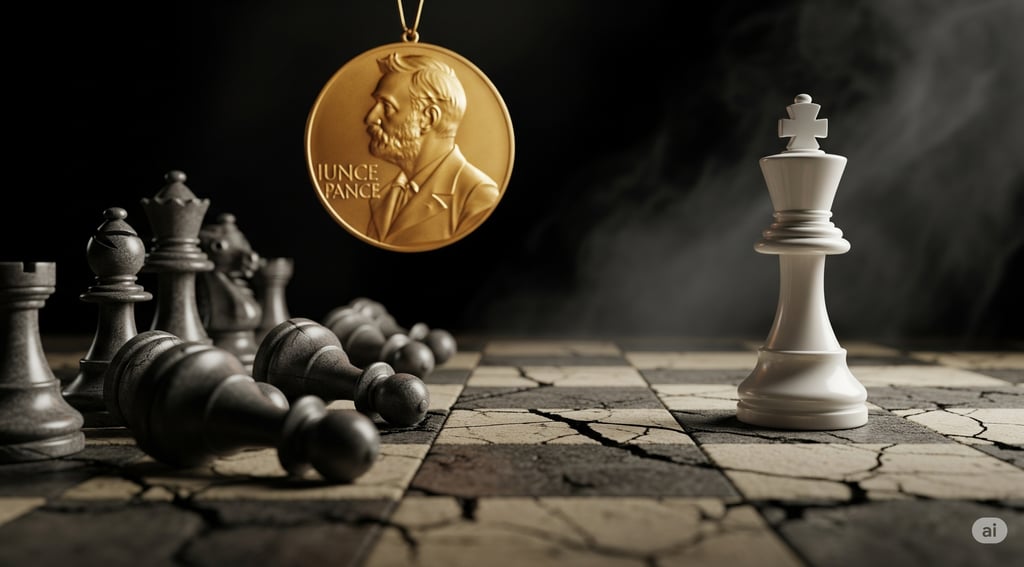The Nobel Prize Gambit: A Look at 2025's Wars, Ceasefires, and the Politics of Peace
The year 2025 has been marked by a series of volatile conflicts and surprisingly swift ceasefires, sparking a cynical yet persistent question in online forums and political commentary: can a war be fabricated to secure a ceasefire, all in the pursuit of a Nobel Peace Prize? Or a Politics of Peace!


The Nobel Prize Gambit: A Look at 2025's Wars, Ceasefires, and the Politics of Peace
The year 2025 has been marked by a series of volatile conflicts and surprisingly swift ceasefires, sparking a cynical yet persistent question in online forums and political commentary: can a war be fabricated to secure a ceasefire, all in the pursuit of a Nobel Peace Prize? This provocative notion, while seemingly far-fetched, has found fertile ground amidst the complex geopolitical landscape of the year, particularly concerning the recent nominations for the prestigious award.
The Nobel Peace Prize, awarded to those who have "conferred the greatest benefit on mankind," has a storied and at times controversial history. From its inception, the criteria for what constitutes a monumental contribution to peace have been debated. In 2025, this debate has been reignited by the nominations of figures like President Donald Trump for his role in brokering ceasefires between Israel and Iran, and between India and Pakistan. These nominations, coming on the heels of short but intense conflicts, have led some observers to question the motivations behind both the conflicts and their resolutions.
The Ceasefires of 2025: A Closer Look
The first half of 2025 witnessed a number of significant flare-ups and subsequent truces. A temporary ceasefire between Israel and Hamas from January to March brought a brief respite to the long-standing conflict, though it ultimately collapsed. More dramatically, a four-day war erupted between India and Pakistan in May, ending with a suddenly announced ceasefire. This was followed in June by a tense standoff and eventual ceasefire between Israel and Iran, with Donald Trump publicly taking credit for de-escalating the situation.
These events, particularly the India-Pakistan and Israel-Iran ceasefires, have been cited by proponents of the "fabricated war" theory. They point to the rapid escalation and equally rapid de-escalation as potential signs of a manufactured crisis, designed to be "solved" by a high-profile figure. The argument suggests that a brief, contained conflict allows a leader to appear as a decisive peacemaker, thereby bolstering their international standing and making them a viable candidate for the Nobel Peace Prize.
The Nobel Nomination Process: Perception vs. Reality
Nominations for the Nobel Peace Prize can be submitted by a wide range of individuals, including members of national assemblies and governments, university rectors, and former laureates. This accessibility means that a nomination itself is not an endorsement by the Nobel Committee. The committee undertakes a thorough, eight-month screening process before making its final decision in October.
Critics of the "fabricate war" narrative emphasize that the motivations behind conflicts are invariably complex, rooted in deep-seated historical, political, and economic grievances. They argue that attributing a war solely to the pursuit of a prestigious award oversimplifies the grim realities of armed conflict and the genuine suffering it entails. Furthermore, ceasefires are often the result of intense, behind-the-scenes diplomacy and a confluence of factors, including military stalemate, international pressure, and the sheer cost of continued fighting.
Historical Precedent and Modern Cynicism
The idea of a conflict being manipulated for political gain is not new. Throughout history, leaders have been accused of using military action to distract from domestic issues or to rally support. The term "wag the dog," popularized by the 1997 film, encapsulates this cynical view of political maneuvering.
However, directly linking the initiation of a war to the specific goal of winning a Nobel Peace Prize is a more recent and potent accusation, fueled by a 24-hour news cycle and the amplification of opinions on social media. The controversies surrounding past Nobel laureates, and the perception that the prize can be politically motivated, have also contributed to this skepticism.
A Neutral Ground
Ultimately, the assertion that wars in 2025 were fabricated for the purpose of securing a Nobel Peace Prize remains a matter of speculation and debate. While the timing of some conflicts and the subsequent high-profile nominations may raise eyebrows, there is no concrete evidence to support such a claim.
A neutral analysis requires acknowledging the possibility of ulterior motives in international relations while also respecting the complexities of war and peacemaking. The events of 2025 serve as a stark reminder of the volatile nature of global politics and the enduring quest for peace, a quest that is often fraught with political maneuvering and the ever-present shadow of human ambition. Whether the pursuit of a Nobel Prize could ever be a primary driver for war is a chilling thought, one that will likely continue to be debated as the year unfolds and the Nobel Committee deliberates.
